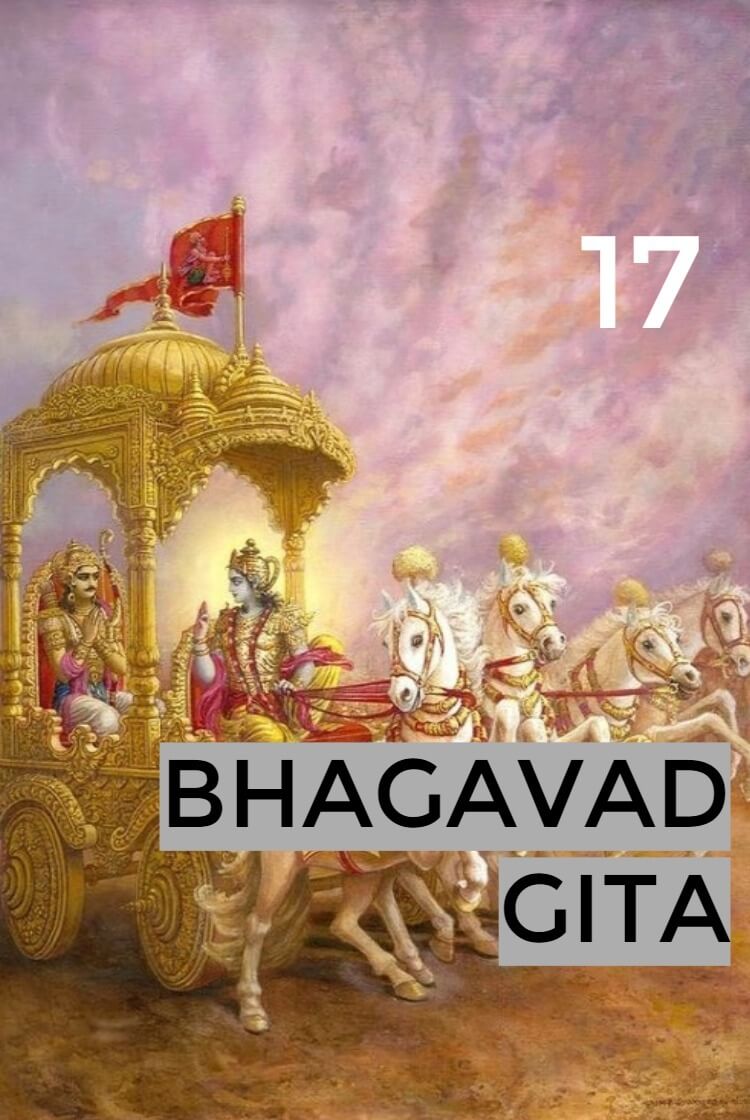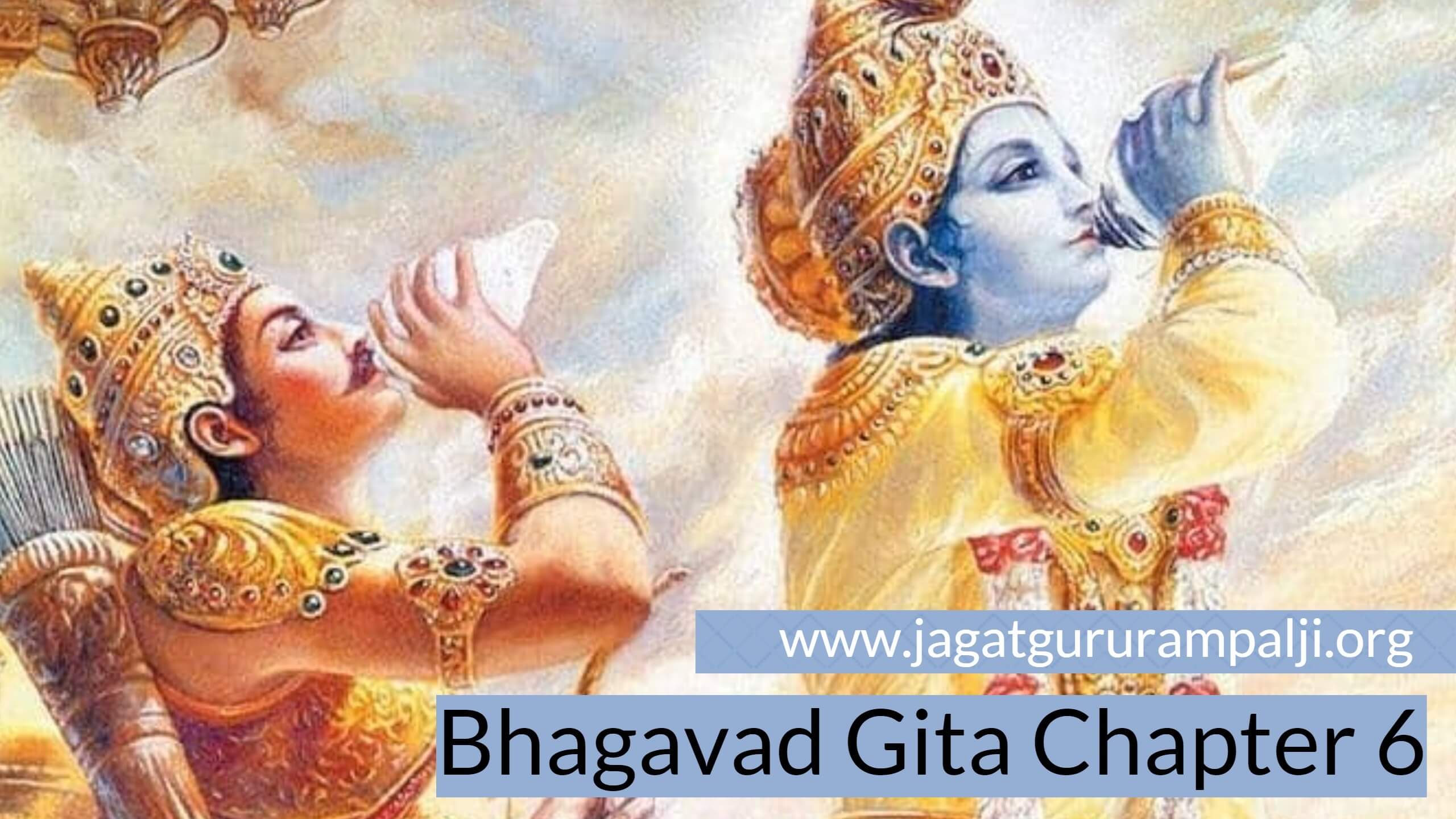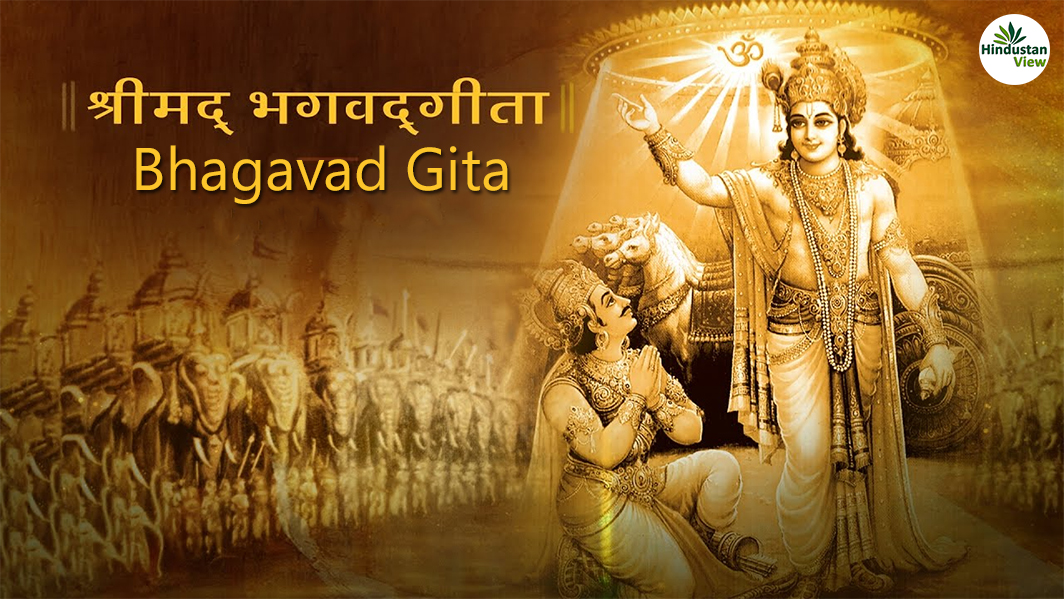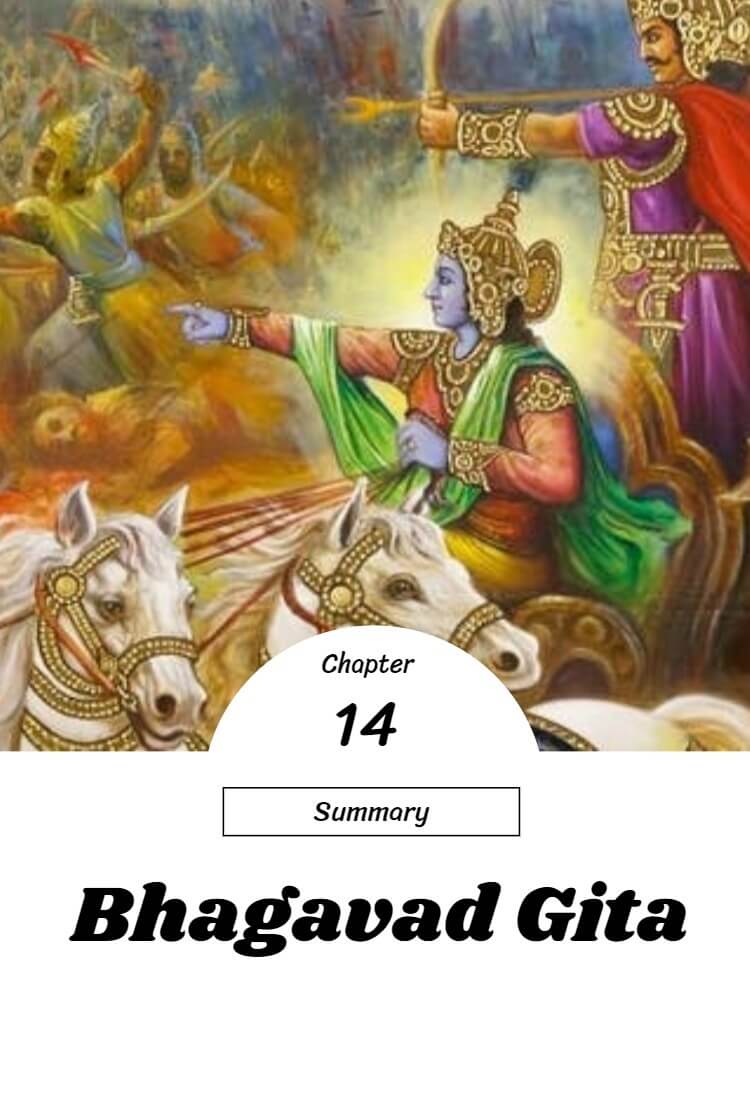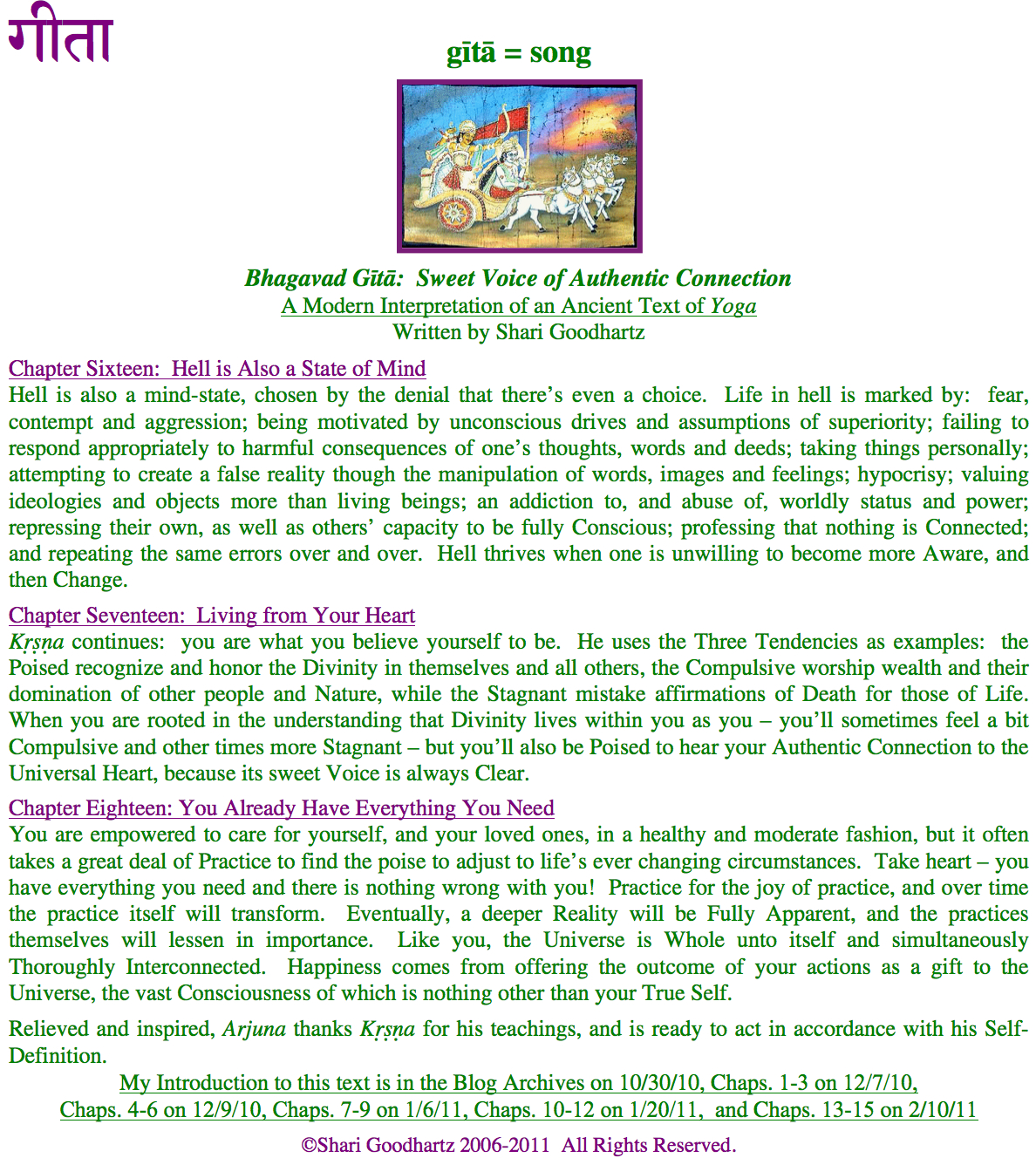Bhagavad Gita Chapter 6 Summary
Bhagavad Gita Chapter 6 Summary - [for attaining the ultimate realization described at the end of the previous chapter (05.29), can the process that was earlier outlined. Web 19 rows arjuna asks krishna whether the path of renunciation or the path of action is better for him. Web the highest self combines opposites like cold and heat, pride and disgrace, or clay and gold. Meditation is more than just shutting. Shree krishna explains that the yogi who becomes free from material contamination and becomes united with god attains this highest state of perfect happiness. Web this is the divine bliss of god, which is infinite in extent. According to krishna, right action, or karma yoga, is also renunciation because it requires the person to renounce their own selfish will. the self—consisting of the mind, senses, and body—can aid the soul. Regarding the sadhna of the purna parmatma (the supreme god), it is. Those who perform prescribed duties without desiring the results of their actions are actual sanyāsīs (renunciates) and yogis, not those who have merely ceased performing. Web [how can this feeling of discouragement be addressed?] krishna:
Web this is the divine bliss of god, which is infinite in extent. Web in bhagavad gita chapter 6, god kaal (narrator of bhagavad gita) has given a description of the worship done by the devotees. Web answer (1 of 3): Web [how is it possible to keep the mind equally disposed when dealing with people of opposite qualities — such as the virtuous yudhishthira and the vicious duryodhana?] arjuna: Arjuna submits to lord krishna as his disciple, and krishna begins his teachings to arjuna by explaining the fundamental distinction between the temporary material body and the eternal spiritual soul. Web the bhagavad gita summary. Shree krishna explains that the yogi who becomes free from material contamination and becomes united with god attains this highest state of perfect happiness. Web in bhagavad gita summary chapter 6, kaal god has given a description of the sadhna of the devotees who do both the types of sadhnas. Web 19 rows arjuna asks krishna whether the path of renunciation or the path of action is better for him. [for attaining the ultimate realization described at the end of the previous chapter (05.29), can the process that was earlier outlined.
He has also elaborated that any ‘hathyog’ (forced meditation) is useless and has also explained about the concept of ‘who is a yogi’. Web the highest self combines opposites like cold and heat, pride and disgrace, or clay and gold. Arjuna submits to lord krishna as his disciple, and krishna begins his teachings to arjuna by explaining the fundamental distinction between the temporary material body and the eternal spiritual soul. Web the bhagavad gita summary. Web in bhagavad gita summary chapter 6, kaal god has given a description of the sadhna of the devotees who do both the types of sadhnas. Web in this video, sadguru explains the essence of dhyana yoga, chapter 6 of bhagavad gita.for a teacher, the best gift is a ready student, eager to learn and pu. Those who perform prescribed duties without desiring the results of their actions are actual sanyāsīs (renunciates) and yogis, not those who have merely ceased performing. Web [how can this feeling of discouragement be addressed?] krishna: O krishna, the path of yoga you. [for attaining the ultimate realization described at the end of the previous chapter (05.29), can the process that was earlier outlined.
Bhagavad Gita Summary Chapter 17 Bhagavad Gita
[for attaining the ultimate realization described at the end of the previous chapter (05.29), can the process that was earlier outlined. Web the bhagavad gita summary. The lord explains the process of transmigration, the nature of selfless service to the supreme and the. He has also elaborated that any ‘hathyog’ (forced meditation) is useless and has also explained about the.
The Bhagavad Gita The Historian's Hut
O dear one, those who do good [by striving for spiritual growth] will never. Arjuna submits to lord krishna as his disciple, and krishna begins his teachings to arjuna by explaining the fundamental distinction between the temporary material body and the eternal spiritual soul. Such a sage sustains their insight among friends and enemies alike, having joined the self to.
Ensaio de compressão de corpos deprova
[for attaining the ultimate realization described at the end of the previous chapter (05.29), can the process that was earlier outlined. Web in this video, sadguru explains the essence of dhyana yoga, chapter 6 of bhagavad gita.for a teacher, the best gift is a ready student, eager to learn and pu. Entitled “the yoga of meditation”, chapter 6 of the.
Chapter 6 Bhagavad Gita Sant Rampal Ji
He has also elaborated that any ‘hathyog’ (forced meditation) is useless and has also explained about the concept of ‘who is a yogi’. Web in bhagavad gita summary chapter 6, kaal god has given a description of the sadhna of the devotees who do both the types of sadhnas. Web the bhagavad gita summary. Web [how can this feeling of.
Bhagavad Gita My Tantric Summary of Chapters 1012 shrishari blog
Vijñāna is the realization of that knowledge as an internal awakening. Shree krishna explains that the yogi who becomes free from material contamination and becomes united with god attains this highest state of perfect happiness. [for attaining the ultimate realization described at the end of the previous chapter (05.29), can the process that was earlier outlined. Web this is the.
Bhagavad Gita Summary Chapter 1 Arjuna Vishada Yoga Part 1 of 20
Entitled “the yoga of meditation”, chapter 6 of the bhagavad gita elucidates meditation as the final gateway to self realisation. Jñāna, or knowledge, is the theoretical understanding obtained by listening to the guru and from the study of the scriptures. Those who perform prescribed duties without desiring the results of their actions are actual sanyāsīs (renunciates) and yogis, not those.
Bhagavad Gita Chapter 6 Hindustan View
Web the highest self combines opposites like cold and heat, pride and disgrace, or clay and gold. Web the bhagavad gita summary. Web 19 rows arjuna asks krishna whether the path of renunciation or the path of action is better for him. Such a sage sustains their insight among friends and enemies alike, having joined the self to yoga in.
Bhagavad Gita Summary Chapter 14 — Bhagavad Gita
Typical of the hindu synthesis, it is considered one of the holy. Such a sage sustains their insight among friends and enemies alike, having joined the self to yoga in meditation and. According to krishna, right action, or karma yoga, is also renunciation because it requires the person to renounce their own selfish will. the self—consisting of the mind, senses,.
Bhagavad Gita Summary Chapter 6 — Bhagavad Gita
Web in bhagavad gita summary chapter 6, kaal god has given a description of the sadhna of the devotees who do both the types of sadhnas. He has called this unlimited bliss in verse 5.21 and supreme bliss in verse 6… O partha, neither in this world nor in the next will they meet with destruction; Web the bhagavad gita.
Bhagavad Gita My Tantric Summary of Chapters 1618 (The End
Web answer (1 of 3): Entitled “the yoga of meditation”, chapter 6 of the bhagavad gita elucidates meditation as the final gateway to self realisation. Regarding the sadhna of the purna parmatma (the supreme god), it is. Web [how can this feeling of discouragement be addressed?] krishna: Web this is the divine bliss of god, which is infinite in extent.
He Has Called This Unlimited Bliss In Verse 5.21 And Supreme Bliss In Verse 6…
Web 19 rows arjuna asks krishna whether the path of renunciation or the path of action is better for him. According to krishna, right action, or karma yoga, is also renunciation because it requires the person to renounce their own selfish will. the self—consisting of the mind, senses, and body—can aid the soul. Web [how is it possible to keep the mind equally disposed when dealing with people of opposite qualities — such as the virtuous yudhishthira and the vicious duryodhana?] arjuna: He has also elaborated that any ‘hathyog’ (forced meditation) is useless and has also explained about the concept of ‘who is a yogi’.
Web In Bhagavad Gita Summary Chapter 6, Kaal God Has Given A Description Of The Sadhna Of The Devotees Who Do Both The Types Of Sadhnas.
Meditation is more than just shutting. Vijñāna is the realization of that knowledge as an internal awakening. O krishna, the path of yoga you. O partha, neither in this world nor in the next will they meet with destruction;
Web The Bhagavad Gita Summary.
According to krishna, right action, or karma yoga, is also. Web answer (1 of 3): Those who perform prescribed duties without desiring the results of their actions are actual sanyāsīs (renunciates) and yogis, not those who have merely ceased performing. Web [how can this feeling of discouragement be addressed?] krishna:
Web This Is The Divine Bliss Of God, Which Is Infinite In Extent.
The bhagavad gita forms a section of the sixth book of the mahabharata, an important sanskrit epic in the hindu tradition that recounts a lengthy struggle and brief war between two sides of the bharata family—the pandavas and the kauravas —over their kingdom of hastinapura. Web in this video, sadguru explains the essence of dhyana yoga, chapter 6 of bhagavad gita.for a teacher, the best gift is a ready student, eager to learn and pu. Regarding the sadhna of the purna parmatma (the supreme god), it is. Entitled “the yoga of meditation”, chapter 6 of the bhagavad gita elucidates meditation as the final gateway to self realisation.
